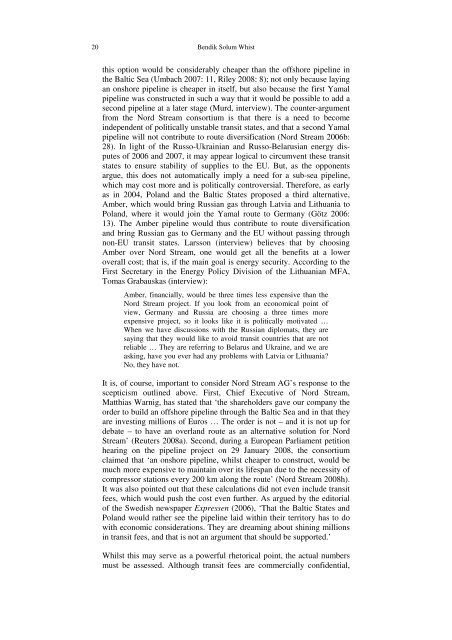Nord Stream: Not Just a Pipeline
Nord Stream: Not Just a Pipeline
Nord Stream: Not Just a Pipeline
Create successful ePaper yourself
Turn your PDF publications into a flip-book with our unique Google optimized e-Paper software.
20 Bendik Solum Whist<br />
this option would be considerably cheaper than the offshore pipeline in<br />
the Baltic Sea (Umbach 2007: 11, Riley 2008: 8); not only because laying<br />
an onshore pipeline is cheaper in itself, but also because the first Yamal<br />
pipeline was constructed in such a way that it would be possible to add a<br />
second pipeline at a later stage (Murd, interview). The counter-argument<br />
from the <strong>Nord</strong> <strong>Stream</strong> consortium is that there is a need to become<br />
independent of politically unstable transit states, and that a second Yamal<br />
pipeline will not contribute to route diversification (<strong>Nord</strong> <strong>Stream</strong> 2006b:<br />
28). In light of the Russo-Ukrainian and Russo-Belarusian energy disputes<br />
of 2006 and 2007, it may appear logical to circumvent these transit<br />
states to ensure stability of supplies to the EU. But, as the opponents<br />
argue, this does not automatically imply a need for a sub-sea pipeline,<br />
which may cost more and is politically controversial. Therefore, as early<br />
as in 2004, Poland and the Baltic States proposed a third alternative,<br />
Amber, which would bring Russian gas through Latvia and Lithuania to<br />
Poland, where it would join the Yamal route to Germany (Götz 2006:<br />
13). The Amber pipeline would thus contribute to route diversification<br />
and bring Russian gas to Germany and the EU without passing through<br />
non-EU transit states. Larsson (interview) believes that by choosing<br />
Amber over <strong>Nord</strong> <strong>Stream</strong>, one would get all the benefits at a lower<br />
overall cost; that is, if the main goal is energy security. According to the<br />
First Secretary in the Energy Policy Division of the Lithuanian MFA,<br />
Tomas Grabauskas (interview):<br />
Amber, financially, would be three times less expensive than the<br />
<strong>Nord</strong> <strong>Stream</strong> project. If you look from an economical point of<br />
view, Germany and Russia are choosing a three times more<br />
expensive project, so it looks like it is politically motivated …<br />
When we have discussions with the Russian diplomats, they are<br />
saying that they would like to avoid transit countries that are not<br />
reliable … They are referring to Belarus and Ukraine, and we are<br />
asking, have you ever had any problems with Latvia or Lithuania?<br />
No, they have not.<br />
It is, of course, important to consider <strong>Nord</strong> <strong>Stream</strong> AG’s response to the<br />
scepticism outlined above. First, Chief Executive of <strong>Nord</strong> <strong>Stream</strong>,<br />
Matthias Warnig, has stated that ‘the shareholders gave our company the<br />
order to build an offshore pipeline through the Baltic Sea and in that they<br />
are investing millions of Euros … The order is not – and it is not up for<br />
debate – to have an overland route as an alternative solution for <strong>Nord</strong><br />
<strong>Stream</strong>’ (Reuters 2008a). Second, during a European Parliament petition<br />
hearing on the pipeline project on 29 January 2008, the consortium<br />
claimed that ‘an onshore pipeline, whilst cheaper to construct, would be<br />
much more expensive to maintain over its lifespan due to the necessity of<br />
compressor stations every 200 km along the route’ (<strong>Nord</strong> <strong>Stream</strong> 2008h).<br />
It was also pointed out that these calculations did not even include transit<br />
fees, which would push the cost even further. As argued by the editorial<br />
of the Swedish newspaper Expressen (2006), ‘That the Baltic States and<br />
Poland would rather see the pipeline laid within their territory has to do<br />
with economic considerations. They are dreaming about shining millions<br />
in transit fees, and that is not an argument that should be supported.’<br />
Whilst this may serve as a powerful rhetorical point, the actual numbers<br />
must be assessed. Although transit fees are commercially confidential,













